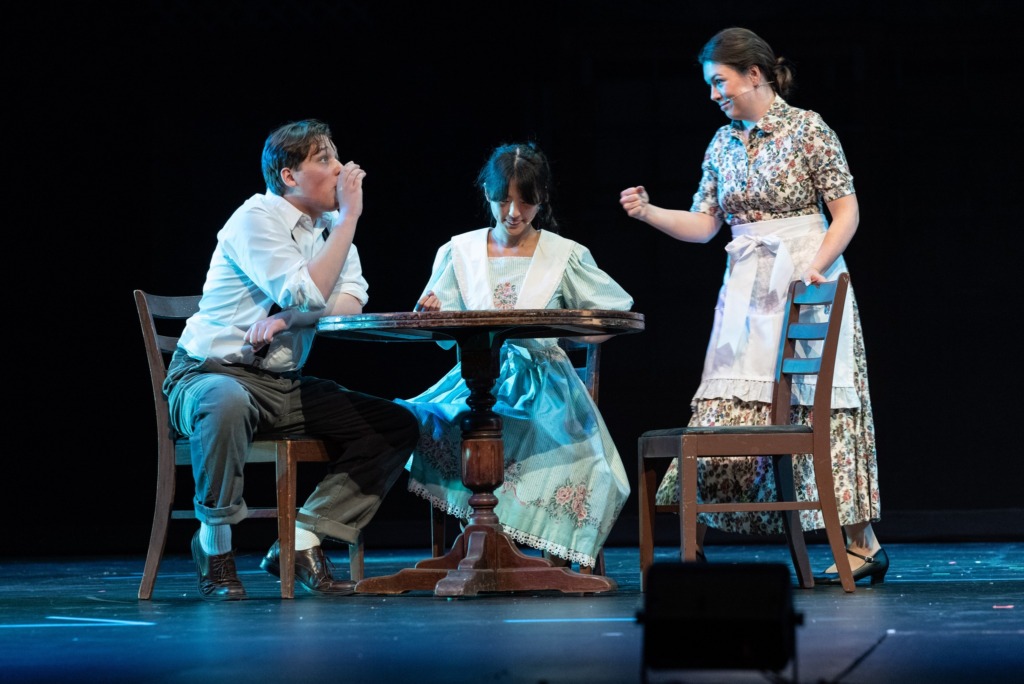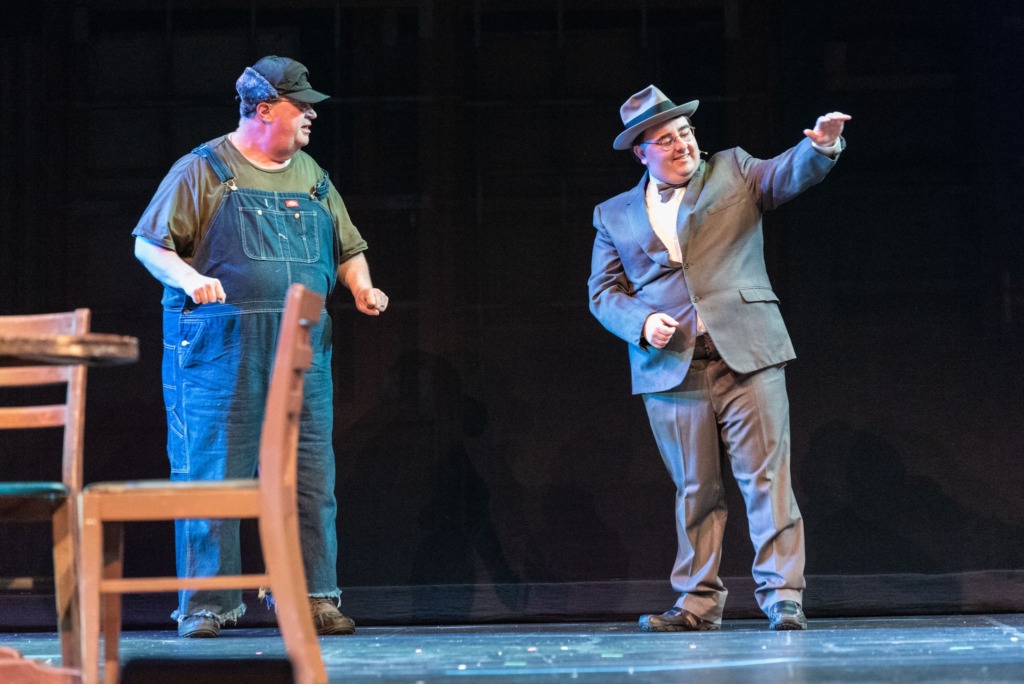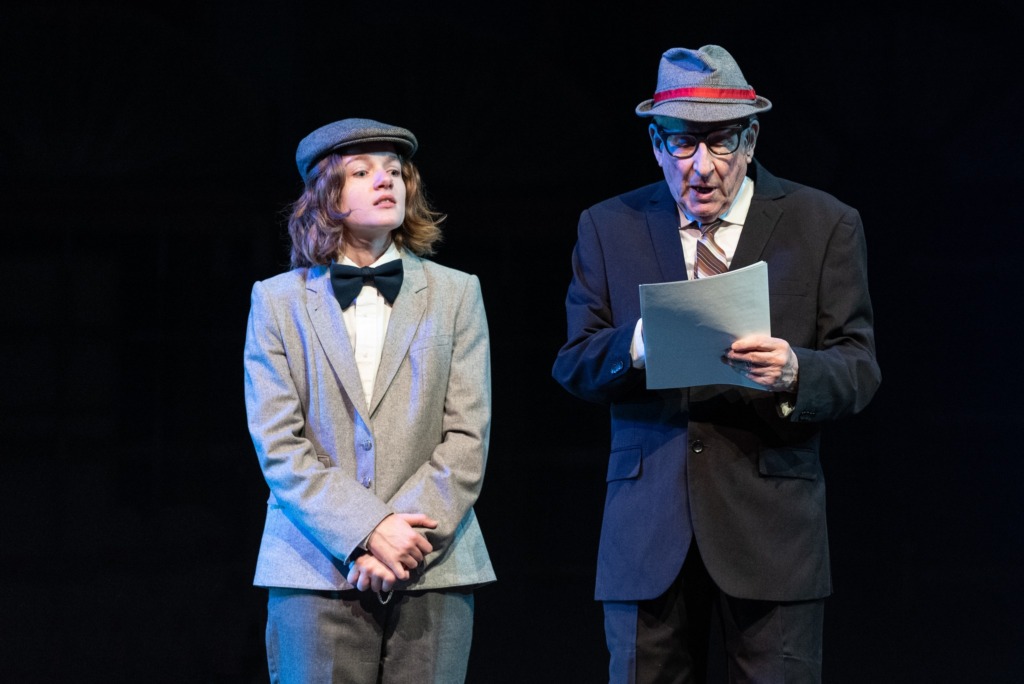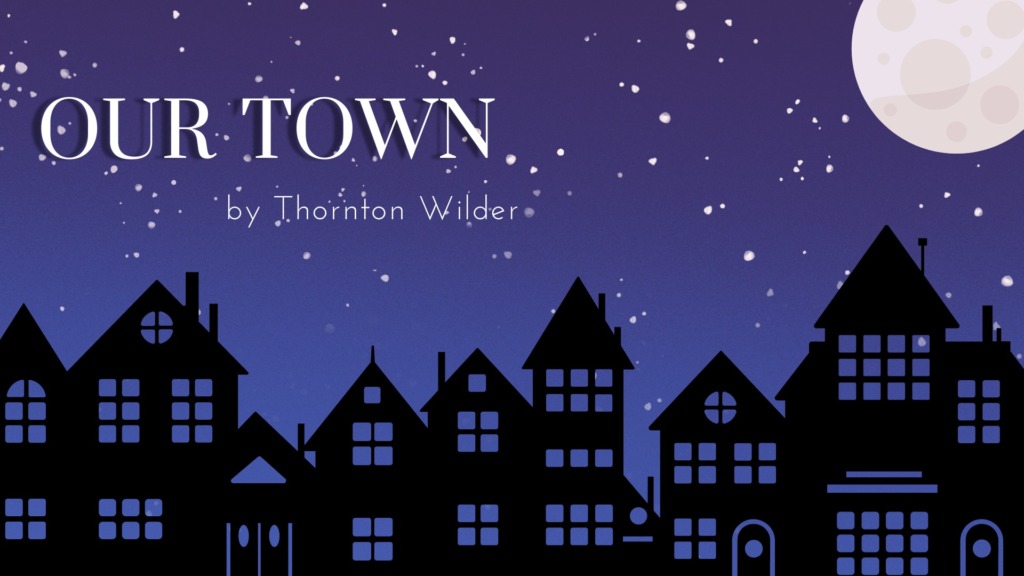“Do any human beings ever realize life while they live it?” That is the question that the incredibly talented cast from Dundalk Community Theatre’s Our Town poses to the audience. Written by Thornton Wilder and Directed by Jennifer L. Gusso, this production brings this classic piece to life with a clean and straightforward approach. Set in the small New Hampshire town of Grover’s Corners (Population:2,642) a character referred to only as the Stage Manager helps guide the audience through the multiple stages of small-town life at the start of the 20th century. We start with the daily life of two important families of the town. One is the town doctor, Doc Gibbs, and the other is the editor of the local newspaper, Mr. Webb. We then move on to the marriage of those small-town children once they’re older and finally end with what happens after marriage. And the Stage Manager is there throughout it all to make sure you understand what really matters in the span of a person’s life.

Upon entering the theatre, you can sense that Gusso and perhaps even the show itself believes the actors to be more important to the space than any material possessions or ostentatious scenery. This is made clear through Technical Director Marc W. Smith’s scenic and lighting design. At the start of the show, one sees a near empty stage and a singular ‘ghost light’ lit centerstage. There is an outline of some buildings at the very back of the back of the space with a black mesh screen lowered in front of them so that you can never quite make out how many buildings there actually are. At each set of curtains there is also a simple stand of lights that will later help the audience to see the sunrise. Aside from this there is not much else added to the scene except for two dining tables, two floral archways, and the occasional set of chairs.
The restrained use of physical props by Properties Manager Amy Vickers only makes the focus placed on the actors even more noticeable. Almost everything throughout the show is pantomimed by the actors. From eating breakfast, to carrying schoolbooks and even the local milkman delivering milk with his cow, is all pantomimed. In fact, the entire cast does such a terrific job at pantomiming you almost forget that there are no props on the stage at all aside from a singular baseball glove carried by the doctor’s son. With the use of entirely pantomimed props the use for sound effects were necessary to provide an audio cue for the audience to understand some of the actions. At times it was a little bit difficult to hear some of the sounds and at one point I thought one of the sound effects was an audience member’s phone ringing. Eventually the level was adjusted, and I could clearly hear that what I thought was ringing was just a sound effect for the milkman’s bottles clanking together.
At the very start of the show is where we meet the character, the Stage Manager. Played by Mo Tacka who provides a very sturdy presence on the stage whenever they are there. You can tell that Tacka has a very strong grasp on why the Stage Manager exists and allows that almost omnipotent knowledge to shine through their dialogue as soon as the house lights fall. You can feel the love that the Stage Manager has for Grover’s Corners and Tacka does an excellent job of allowing that love to shine through on the stage. They also have a marvelous ability to jump in and out of characters throughout the show as the Stage Manager takes on the role of several figures in the town to interact with the characters within the story. Tacka allows the audience to know exactly when the Stage Manager is just the Stage Manager and also when the Stage Manager is an active player in the scene.
But of course, Grover’s Corners contains more than just the omnipresent Stage Manager. You also have the two young lovers that the majority of the story is centered around. The first being Emily Gibbs, played by Molly McVicker. McVicker’s youthful exuberance and personality shines out from the first moment she stepped onstage. McVicker also masterfully ages up the character throughout the show through her demeanor and mannerisms. I would like to also commend McVicker’s heart-wrenching performance in the third act. The emotional turmoil and nuanced level of performance tugged at the heartstrings and brought a tear to the eye of everyone in the audience.

Then there is the other half of the young lovers. George Gibbs, played by Owen Roughton, who is also extremely skilled at slowly aging the character through tone and mannerisms. As someone who was more inclined to pursue my hobbies rather than do housework I found I could relate to Roughton’s portrayal of George almost a little too well. Roughton’s youthful charm is clear throughout the beginning of the show. His excellent understanding of the character is most prominent in the scene leading up to a wedding. Roughton is able to bounce back and forth between several major emotions at the drop of a hat and makes the audience really believe the anxiety the character experiences in that moment. Both McVicker and Roughton have an honest connection when sharing the stage. It’s very difficult to think that they have not been close friends since childhood.
And where there are young lovers there are bound to be the families of said lovers. Their emotional revelations to watching a member of their household grow up and create a new family. Mare Kemp’s (Mrs. Webb) keen expression and tonality throughout the performance creates the perfect visage of a traditional mother figure providing guidance and love to her children. Kemp’s pantomimed motions in the kitchen often made me think that she was standing in front of the stove making breakfast.
The same can also be said for Sharon Maguire’s (Mrs. Gibbs) portrayal of the wife who aspired to see the world but instead put her family first. Maguire’s approach to this character reminds me of a more progressive mother, one who didn’t just leave man’s work to the men. Maguire provides a strong and upfront portrayal which only makes her tonality and stoicism in the third act even more poignant.
Then of course we have the heads of each of these households. Both of whom provide their offspring with the stereotypical paternal advice regarding living a happy life. Adam Nelson’s interpretation of Doctor Gibbs provides the audience a nice picture of the classic small-town doctor and all around family man. Nelson’s subtle and nuanced tone and mannerisms really give the audience the impression of a caring and understanding father figure. Colby D. Sample’s understanding of Mr. Webb on the other hand is more of the stern, conservative and no-nonsense father one would imagine in the early 1900’s. Sample’s excellent comedic timing and witty exchanges is something that should not go unmentioned. His capability to be the overbearing and strict father, to making it sound as though it were a bad dad joke is truly impressive.
And finally, no idyllic family scene would be complete without the presence of younger siblings within the household. Both Klawdia Gong (Rebecca Gibbs) and Ethan Buttman (Wally Webb) create the complete family picture and provide the audience with an accurate portrayal of being the younger sibling of the family. Gong truly plays the part of the excitable if somewhat aggravating little sister very well.

The rest of the cast certainly provides a rounded landscape that allows the audience to really see the distinct charm and character of Grover’s Corners. Complete with classic archetypes like Joe the paper boy played by Jamie Luber, Simon Stimson the town drunk played by Dylan Burmeister, and Mrs. Soames the town gossip played by Cathy Herlinger. All these portrayals help to make one truly believe they’ve been transported back in time to a simpler and more idyllic version of living. Dave Guy (Professor Willard/Joe Stoddard), Daniel Luber (Howie Newsome), Leonard Gilbert (Constable Bill Warren), and Edwin Walker (Si Crowell/Baseball Player/Mr. Carter) also help the audience to really be involved and a part of the simple, small-town life.
With such an astoundingly talented group of performers you might not want to miss the chance to see this idyllic and picturesque classic brought back to life in a simple and candid way.
Running Time: Approximately 2 hours and 10 minutes with one intermission
Our Town plays through March 12, 2023 with Dundalk Community Theatre located on the campus of the Community College of Baltimore County Dundalk in the John E. Ravekes Theatre— 7200 Sollers Point Road in Dundalk, MD. Tickets are available for purchase by calling the box office at (443) 840-2787 or by purchasing them in advance online.

